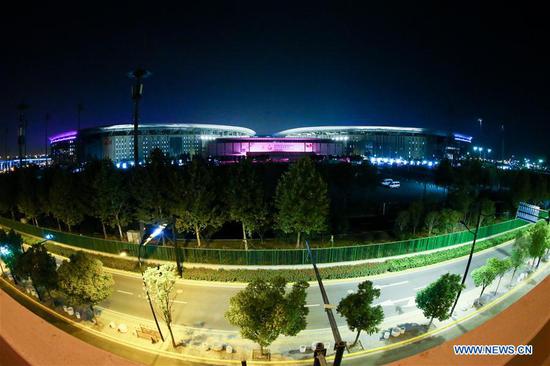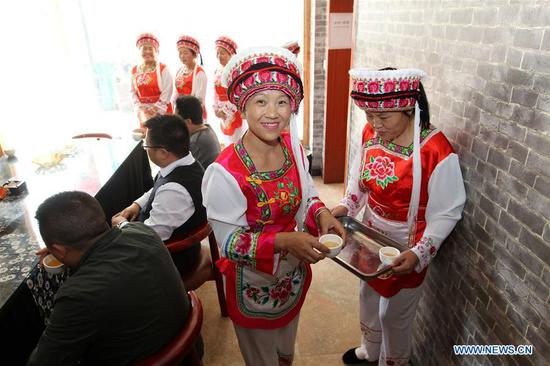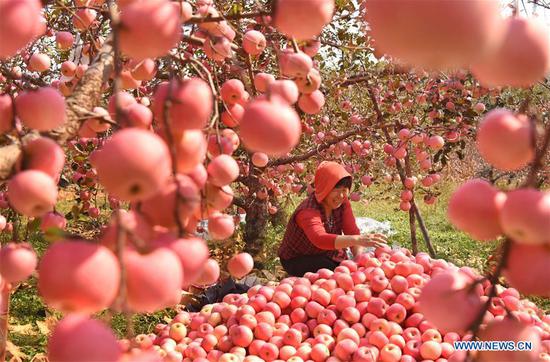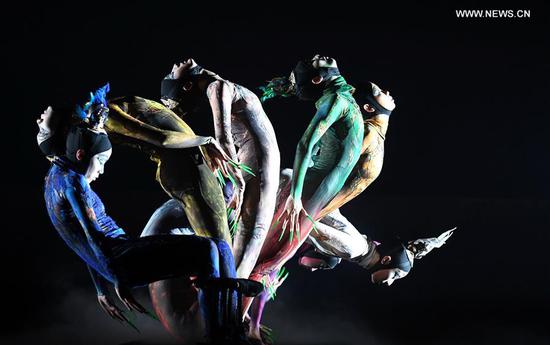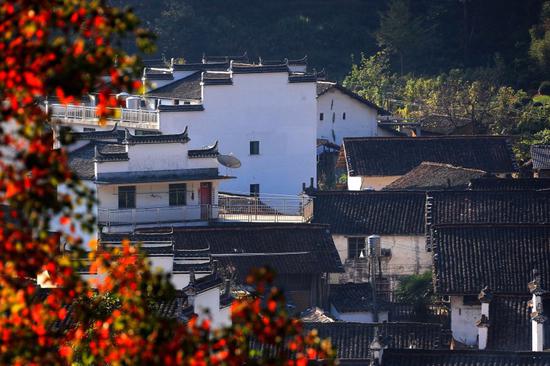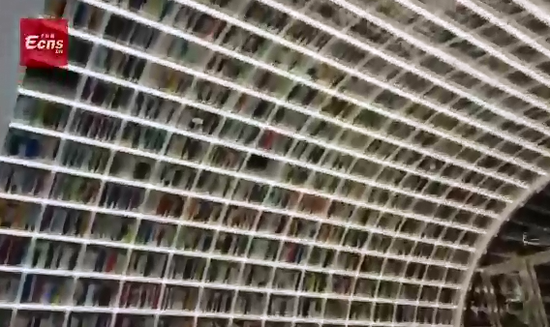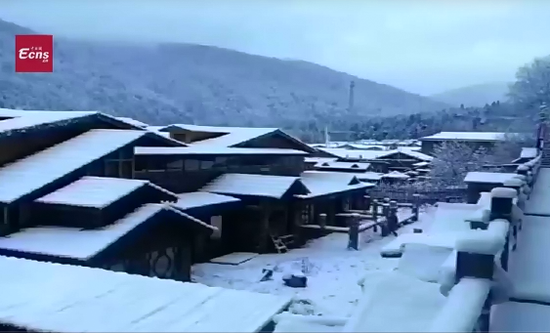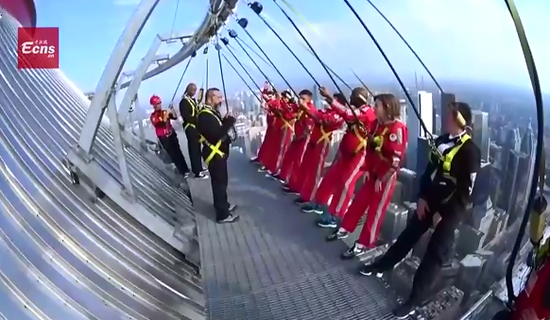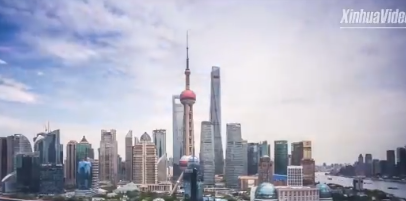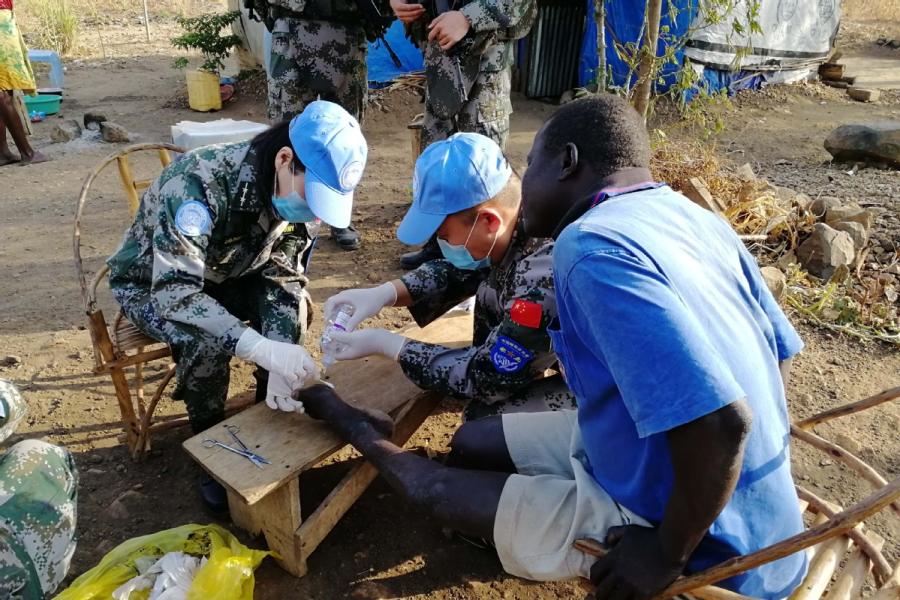
Chinese peacekeepers provide medical care to people in Juba, South Sudan. (Photo/CHINA DAILY)
Growing contribution to UN missions ensures stable development
Loud cheers fill the sweltering air in Juba, capital of South Sudan.
It is Aug. 1, Army Day, when China celebrates the founding of the People's Liberation Army in 1927, and soldiers of the Chinese Peacekeeping Infantry Battalion are commemorating the event.
With colleagues cheering wildly on the sidelines, competitors in a relay race involving battalion members pass the baton, heedless of the scorching sun, and the support company eventually wins the day.
For more than a decade, China has been playing a bigger role in protecting global peace. This is the fourth group of infantry soldiers drawn from the 83rd Combined Corps of the PLA.
Under the United Nations Mission in South Sudan, they are assigned to protect local civilians and UN personnel and humanitarian assistance staff members, patrol defense areas, secure the UN compound, enforce a weapon-free zone and escort humanitarian assistance to areas under their jurisdiction.
They also have safely evacuated UN personnel during emergencies. On average, 506 troops have been deployed daily, along with 73 vehicles and hundreds of weapons.
The 700-strong battalion, consisting of infantry and artillery personnel, scouts and engineers, arrived in four groups in November. It is nearing the end of its mission.
"We have fully fulfilled the mandate of UNMISS," said Colonel Chen Ximing, the battalion's commanding officer.
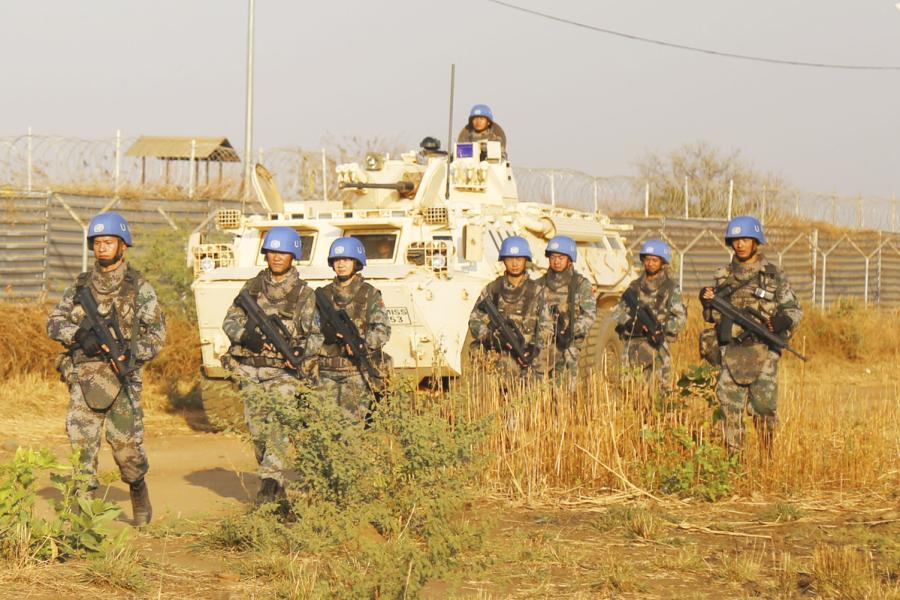
Chinese peacekeepers patrol in Juba, capital of South Sudan, to protect the population during the May Day holiday. (Photo/Xinhua)
The troops have also spent more than 100 days on duty outside Juba, covering over 50,000 kilometers in southern and central areas of the country. They have undertaken nine cordon-and-search operations and resolved 300 hostile incidents without violence within the weapon-free zone, including three in which armed insurgents penetrated the zone, intending to kidnap civilians.
"Pre-emptive, careful and strategic planning has given our soldiers the ability to withstand and overcome unexpected incidents in volatile environments," Chen said.
"We have faced serious situations in the Yei River area, about 160 km southwest of Juba ... Our presence restored security and allowed humanitarian and investigation teams to access the areas."
The Canadian Ambassador to South Sudan, Alan Hamson, lauded the Chinese peacekeepers' efforts.
He said in a tweet in February, "This region has been tormented by horrible violence in the past two years, but its people are now protected by Chinese peacekeepers.
"I saw them patrol the areas, and they were all friendly toward local people. Among the permanent members of the UN Security Council, China is the biggest contributor to the UN peacekeeping mission."
The fourth Chinese infantry battalion based in Juba has also received high praise from UNMISS. An assessment report in the first half of this year looked at the battalion's preparedness, and it won high marks for overall performance. The report said it excelled in personnel management, logistics, operations, communications and training.

Jia Xiaochen, a Chinese peacekeeper in the infantry squad shares candy with children in Juba. (Photo/Xinhua)
Growing stature
Joining the battalion at its camp during the Army Day celebrations, the deputy head of UNMISS, Moustapha Soumare, said the presence of Chinese peacekeepers was reassuring, given the complex situation and volatility in South Sudan.
"It is an indication that China is committed to peace in South Sudan. We are proud to have a competent and confident contingent here with us," he said.
As its global stature has grown, China has strengthened its role in peacekeeping missions.
It is the world's 11th-largest contributor of troops, with about 2,600 serving in Mali, the Democratic Republic of Congo and Liberia, among other countries.
Chinese peacekeepers have also earned praise in these and other nations.
In February, all 395 members of the fifth Chinese peacekeeping force to Mali, consisting of guards, engineers and medics, were awarded the United Nations Peace Medal of Honor for their dedication and outstanding contributions in the country.
Chen said: "Besides being soldiers, we are fathers, brothers and uncles. So we offer our sympathy, too, to the locals who have been weighed down by years of war and poverty."
Humanitarian assistance provided by the peacekeepers has included setting up medical camps and informing UN agencies of locals' needs, such as schools and educational equipment and supplies.
"Besides promoting a positive image of the UN, we are committed to enhancing understanding between the peacekeepers and the locals, because this synergy is crucial to fulfilling our mandate," Chen said.
He said he is proud that, under his watch, his troops have been diligent and disciplined.
"Our actions are speaking louder than words in our mission here. We are making our contributions to society by promoting peace and security in Africa, because we believe that war stymies development and robs people of their dignity and future."
Chen said there are at least four other battalions stationed in Juba-from Bangladesh, Rwanda, Ethiopia and Nepal.
Always aware of the dangers facing his troops, he said pre-deployment training has been improved.
The battalion has also improved communications and increased the number of information and operations personnel to ensure that patrols receive timely information about the situation on the ground. This is done together with UNMISS police, local law enforcement authorities and a civilian network.
"In addition, we undertake a monthly assessment to safeguard our troops' mental health. We keep close tabs on their daily work and rest schedules and encourage them to exercise. They carry equipment weighing at least 23 kilograms during foot patrols, and they have to be both mentally and physically prepared," Chen said.
While the infantry battalion is stationed in Juba, medical and engineering teams are in Wau, a city and state about 600 km from the capital.
Lieutenant Colonel Zhao Jihui, who is serving in Wau, said the 63-member medical team has earned admiration from colleagues for its strong sense of duty and strict adherence to the UN Code of Conduct.
The team supports at least 2,000 military personnel and UN officials, and assists some 30,000 displaced civilians, who are threatened by malnutrition and starvation.
"Because of the security situation, they are unable to farm... and others are afraid to go back to their farms. Besides, there is insufficient produce due to the weather conditions in this area and the fact that they still use traditional farming methods," Zhao said.
By last month, the team had handled 1,856 outpatient cases, 291 emergency cases and 72 inpatient cases, including 27 surgical patients. It also assisted in evacuating 10 patients to a hospital in Uganda.
The team handles many medical cases, ranging from hernias to severe appendicitis to rare cases of malaria.
However, difficult pregnancies pose a serious challenge, Zhao said. Such cases are referred to better-equipped hospitals, as the team avoids performing caesarian sections due to poor sanitation in the camp.
Nonetheless, in September last year, the team handled an emergency case and, after two days with round-the-clock observation and use of traditional Chinese medicine, the patient gave birth to a girl.
As the medical and engineering teams end their mission, they have become stronger through the invaluable lessons learned. They have honed their skills in a volatile environment and promoted cultural exchanges.
"The officers are drawn from different provinces back home, and after their African tour, they know more about the continent. And they now closely value China's independence and achievements," Zhao said.
He added that this has been his second mission serving as a UN peacekeeper. He was stationed in Liberia in 2005 and'06 and is happy that the 15-year mission there has ended after peaceful elections were held in December.
"China is committed to peace and security. Just as Liberia has found peace, so will South Sudan," he said.
Chen said news of a peace deal between the South Sudan government and warring factions was welcomed. The agreement was signed in June by President Salva Kiir and rebel leader Riek Machar.
"It is time the people here benefited from peaceful development. I can see from their faces that they are worn out from war. Peace should be valued, and China is happy to commit to this responsibility," Chen said.
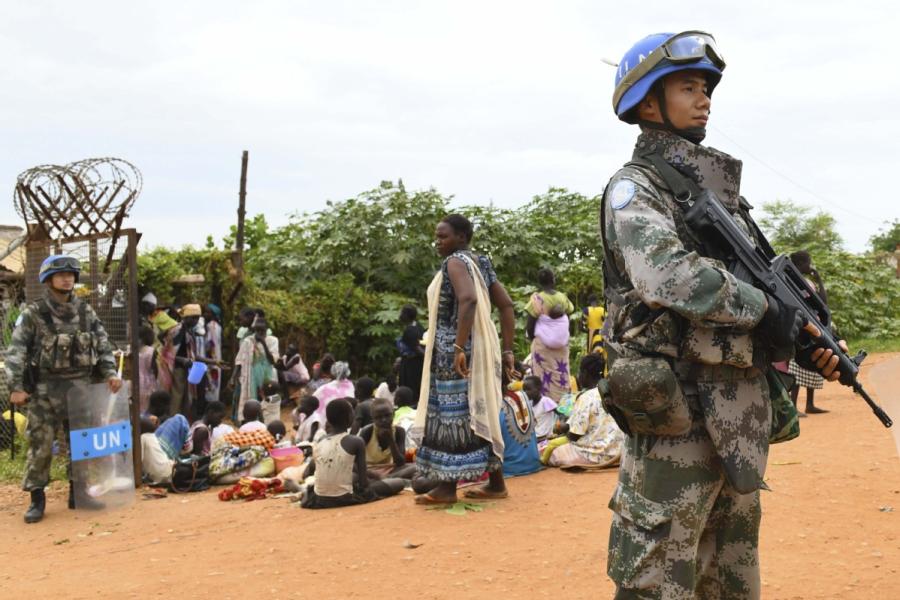
Chinese peacekeepers protect local people in a camp where weapons were confiscated in Juba in May. (Provided to China Daily)
Crucial role
In an earlier interview with China Radio International, David Shearer, the special representative for South Sudan and head of UNMISS, commended the Chinese troops based in Juba and Wau, describing them as efficient, cooperative and amiable.
"This is crucial in building connections and bridges. We do not want to be seen as an invasion force, but are here to help. When we connect with people, we lower their anxiety and improve their ability to interact with us," Shearer said.
He said that completion of tasks undertaken by the engineering team in Wau had improved transportation access for both the UN and locals.
"Generally, the Chinese soldiers have set very high standards. Imagine a country the size of France with only 300 km of tarmac road that is underfunded and always washed away during the rainy season. The engineering team is doing an extremely important job."
Charles Ladu, the representative of Nakitun village, which is inside the weapon-free zone, said there is a semblance of normalcy under the Chinese peacekeeping patrol. Residents can attend school and even farm after the camp team repaired and dug a new water bore hole for them.
"We are safe. We suffered for a long time, and we thank them for our security and also for a school that will take care of our children," Ladu said.
Hillary Lukudu, headmaster of Nakitun Preschool, said the children will have a better learning environment once construction of a new school, carried out in partnership with UNICEF, is completed.
"We have more than 100 students registered, but only half attend, as the current facility cannot house them all. Education is the foundation of any nation, and with the help of the Chinese we are building this future."
China's approach has not gone unnoticed.
Chris Alden, a scholar from the International Relations Department of the London School of Economics and Political Science and co-author of China and Africa: Building Peace and Security Cooperation on the Continent, said China has redefined the dynamics for peace and security in Africa.
"China has taken an integrated approach in Africa, where it is putting strong emphasis on restoring peace while promoting development, too," Alden said at a forum organized by the Shanghai Institutes for International Studies in June.
"We can see that the country is keen on developmental peace and using economic empowerment as an avenue toward peace."
While noting that Africa's traditional partners have long been involved on the continent, Alden said China's approach is a game-changer. "An empowered people will be more willing to look for alternative avenues for peace, and will not easily resort to war," he said.
Peter Kagwanja, CEO of the Africa Policy Institute in Kenya, said China is committed to continuing support for Africa's goal of "silencing the guns" as stated in the African Union's development blueprint.










